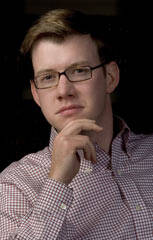As I write this I am staring at a screen. On my way home, I will check my phone for text messages, maybe browse Facebook. Tonight I will pay my bills online and scroll through my digital video recorder. I am tempted to buy an iPad.
There is little in my life that is not mediated by the ones and zeroes of computer code. Only on the subway can I read The New York Times without digital distraction. This is not meant as a complaint. I am not about to retire my computer or drop my phone contract. My life is simply exemplary of the digitized world in which we all live.
What does concern me are the habits of mind that digital attachment can foster. Here again I write from experience. What has surprised me is that the digital realm has recently afforded me a kind of deliverance.
But first, the signs of my attachment: a job that calls for attention to detail, quick turnaround and follow-up, all facilitated by the near constant use of e-mail. The Internet is ever present, signaled by the multiple windows open in my browser: our Web site, of course, but also Facebook, Twitter and Catholic News Service. At home I make a habit of checking our finances online, and for fun I scan my Netflix queue or peruse Amazon.com.
All of these resources enable me to do my work efficiently. But distractions abound. I have already checked my e-mail multiple times while writing these words. None of it is urgent, yet the compulsion persists. Surely, too, I could wait until the end of the month to read our financial statements. But why not take a quick peek?
These habits have quickened my mind, but they have also tested my patience. It has become more difficult for me to write for long stretches at a time. I grow frustrated when I do not have ready access to the Web. Lately, I have tried to abide by certain disciplines. While on vacation recently, I shut off my phone’s e-mail alerts so I wouldn’t rush to check my inbox every time it beeped. (Junk mail, usually.) At home, I try to spend more time playing with my infant daughter and less time seated at my computer.
And I read more. In fact, books have become a remarkably effective remedy for my digital malaise. Reading forces me to sit still for long periods. I lose track of time and forget about the tasks that await me. Sometimes I encounter a sentence or sentiment that forces me to examine my life in a new way. I am transported.
This may seem like a simple solution, but it was not immediately clear to me. A few years ago, I developed a case of vertigo that impaired my reading ability. Over time I discovered that while I could read newspapers and magazines, books were a distinct trial. To fill the time I spent more time online dealing with business and family matters.Looking back I can see that my affliction was as much spiritual as physical. The life of prayer, after all, requires precisely the kind of patience that I was finding more and more elusive. Curiously, my reprieve came from the very world that initially seemed to threaten my peace of mind.
Reader, I bought a Kindle, an electronic reading device that is both a product of the digital revolution and a refutation of it. Books can be downloaded in minutes, and the text is easy to manipulate. (Changing the font size and column width has helped diminish my symptoms.) Yet like its principalcompetitors, the Kindle is simply a mechanism for reading. You can’t browse the Internet, check your e-mail or watch movies. It is a modern improvement on an ancient pursuit.
Digital readers may someday lose their market share to the iPad, but I hope not. There should be room in our digital world for devices that favor less over more.









It was refreshing to read an article that neither lauded all technological advances as unqualifiedly good, nor waxed nostalgic for things that, although they seem old now, once were new. I certainly have benefited tremendously from technological advances that enable me to access, with a computer and a screen-reading program, all kinds of printed materials (including America) that twenty years ago would have been inaccessible to me or accessible only with the assistance of a person to read them. At the same time, I have come to regard as something of a benefit that not all technological advances are as readily or quickly available to me, as a person with a disability, than they are to nondisabled persons. In a way, that helps to take some of the pressure off me to own the absolutely latest and greatest devices, many of which I regard as representing no more than marginal "bells and whistles" type improvements on what went before.
Of particular interest to me were your observations about the Kindle and similar reading devices. Indeed, some of the best new technology is what enables us more easily to engage in an ancient pursuit. Although I question the utility of many of the silly devices we are being told we cannot live without, I think the Kindle (though it is not yet accessible to me, as a blind person) is wonderful because it puts the printed word in people's hands. For me, it is very much like what technology that enables the fast production of Braille does for blind people who can read it. And those of us who believe that Braille - not a screen reader - is the key to literacy for blind people, are very grateful for new technology that gives us access to something so tried and true.